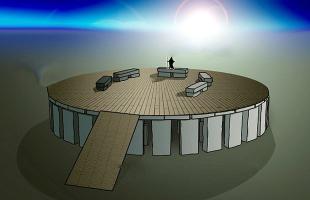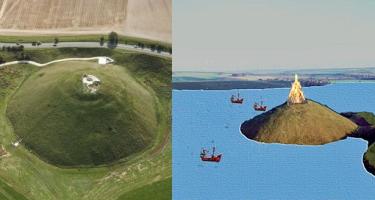Copy Link
Add to Bookmark
Report
AIList Digest Volume 4 Issue 271

AIList Digest Monday, 1 Dec 1986 Volume 4 : Issue 271
Today's Topics:
Queries - Conferences in D.C. Area &
Rutgers Seminar on Office Systems &
Good AI Games That Learn,
Administrivia - Proposed Split of this Group,
Ethics - AI and the Arms Race,
Mathematics - P = NP
----------------------------------------------------------------------
Date: 26 NOV 86 18:43-EST
From: WLMILLIO%GALLUD.BITNET@WISCVM.WISC.EDU
Subject: Anything in D.C. area?
All of the conferences that are advertised seem to be very, very far away
from the Wasington, D.C. area. Since I, and I'm sure there are others,
fit the stereotype of the starving student, I would be interested in knowing
if there are any conferences or seminars being offered in the Washington
area, either by some of the Universities here, or by corporations or
professional organizations in the area.
"Acceptable" seminars or conferences really mean anything related to the
field of AI, from expert systems design, to smart programming, to you name
it.
Please respond if you are aware of anything being planned between now
and January of 88.
William Millios
Gallaudet University
Washington, D.C.
WLMILLIOS@GALLUA.BITNET
------------------------------
Date: 0 0 00:00:00 EST
From: "^MRobert Breaux" <breaux@ntsc-74>
Reply-to: "Robert Breaux" <breaux@ntsc-74>
Subject: RUTGERS SEMINAR ON OFFICE SYSTEMS
I am interested in the topic of Professor Bruce Croft's 10:00 am 20 Nov
talk on Planning and Plan Recognition in Office Systems, although I was
unable to make it. Will there be any subsequent written document
that I could receive?
Robert Breaux
Naval Training Systems Center
Orlando, FL 32813-7100
(305) 646-5529
2
------------------------------
Date: 28 Nov 86 19:18:18 GMT
From: uwslh!lishka@rsch.wisc.edu (a)
Subject: Good AI games which learn.
I am an undergraduate interested in games which learn. Now, I know
that there are a LOT of AI games out there...however, I am looking for source
code, or references to where I can get source code,
on games which actually "learn" (in some sense of the word
...I know I'm being sort of vague, but I'm not sure of what is out there).
These games should be public domain, and something that
can be modified easily (preferably in a block structured language like C [my
favorite] or Pascal or Modula-2). Also, I am not looking for chess games, or
any other games which simulate "intelligence" by performing lookahead...I want
games which will modify their actions according to how good (or bad) the player
is, and which are possibly able to detect patterns in the human player's (or
another computer player's [uh, oh -- Searle, Turing Test...]) "styles".
I know I am being sort of picky, yet vague as to what I want, but I
am interested in game-learning algorithms which have some foundations
in AI (one specific game-type would be those that can converse, yet can add
to their vocabulary...another would be an arcade game which gets "better"
or "worse" depending on who's playing). Please mail responses to me...I'll
post the names of any good programs I receive at a later date. Thanks in
advance.
--
Chris Lishka /lishka@uwslh.uucp
Wisconsin State Lab of Hygiene <-lishka%uwslh.uucp@rsch.wisc.edu
\{seismo, harvard,topaz,...}!uwvax!uwslh!lishka
------------------------------
Date: 29 Nov 86 01:44:08 GMT
From: jbn@glacier.stanford.edu (John B. Nagle)
Subject: Proposed: a split of this group
I would like to suggest that this group be split into two groups;
one about "doing AI" and one on "philosophising about AI", the latter
to contain the various discussions about Turing tests, sentient computers,
and suchlike.
John Nagle
------------------------------
Date: 30 Nov 86 01:48:18 GMT
From: spar!freeman@decwrl.dec.com (Jay Freeman)
Subject: Re: Proposed: a split of this group
I second the motion.
------------------------------
Date: 24 Nov 86 20:34:13 GMT
From: tektronix!tekcrl!tekchips!willc@ucbvax.Berkeley.EDU (Will
Clinger)
Subject: Re: AI and the Arms Race
In article <2862@burdvax.UUCP> blenko@burdvax.UUCP (Tom Blenko) writes:
>If Weizenbaum or anyone else thinks he or she can succeeded in weighing
>possible good and bad applications, I think he is mistaken. Wildly
>mistaken.
>
>Why does Weizenbaum think technologists are, even within the bounds of
>conventional wisdom, competent to make such judgements in the first
>place?
Is this supposed to mean that professors of moral philosophy are the only
people who should make moral judgments? Or is it supposed to mean that
we should trust the theologians to choose for us? Or that we should leave
all such matters to the politicians?
Representative democracy imposes upon citizens a responsibility for
judging moral choices made by the leaders they elect. It seems to me
that anyone presumed to be capable of judging others' moral choices
should be presumed capable of making their own.
It also seems to me that responsibility for judging the likely outcome
of one's actions is not a thing that humans can evade, and I applaud
Weizenbaum for pointing out that scientists and engineers bear this
responsibility as much as anyone else.
By saying this I neither applaud nor deplore the particular moral choices
that Weizenbaum advocates.
William Clinger
------------------------------
Date: 26 Nov 86 17:58:12 GMT
From: eugene@titan.arc.nasa.gov (Eugene Miya N.)
Subject: Re: AI and the Arms Race
>Will Clinger writes:
>In article <2862@burdvax.UUCP> blenko@burdvax.UUCP (Tom Blenko) writes:
>>If Weizenbaum or anyone else thinks he or she can succeeded in weighing
>>possible good and bad applications, I think he is mistaken.
>>
>>Why does Weizenbaum think technologists are, even within the bounds of
>>conventional wisdom, competent to make such judgements in the first
>>place?
>
>Is this supposed to mean that professors of moral philosophy are the only
>people who should make moral judgments? Or is it supposed to mean that
>we should trust the theologians to choose for us? Or that we should leave
>all such matters to the politicians?
>
>Representative democracy imposes upon citizens a responsibility for
>judging moral choices made by the leaders they elect. It seems to me
>that anyone presumed to be capable of judging others' moral choices
>should be presumed capable of making their own.
>
>It also seems to me that responsibility for judging the likely outcome
>of one's actions is not a thing that humans can evade, and I applaud
>Weizenbaum for pointing out that scientists and engineers bear this
>responsibility as much as anyone else.
>
>William Clinger
The problem here began in 1939. It's science's relationship to
the rest of democracy and society. Before that time science was
a minor player. This is when the physics community (on the part of
Leo Szilard and Eugene Wigner) when to Albert Einstein and said:
look at these developments in nuclear energy and look where Nazi Germany
is going. He turn as a public figure (like Carl Sagan in a way)
went to Roosevelt. Science has never been the same. [Note we also
make more money for science from government than ever: note
the discussion on funding math where Halmos was quoted.]
What Tom did not point out is where or not scientists and engineers
have "more" responsibility. Some people say since they are in the know,
they have MORE responsibility, others say, no this is a democracy
they have EQUAL responsibility, but judgments MUST be made by it's
citizens. In the "natural world," many things are not democratic
(is gravity autocratic?)... well these are not the right words but
the illustrate the point that man's ideas are sometimes feeible.
While Weizenbaum may or may not weigh moral values, he is in a
unique position to understand some of the technical issues, and he
should properly steer the understanding of those weighing moral
decisions (as opposed to letting them stray): in other words, yes,
to a degree, he DOES weigh them and yes he DOES color his moral values
into the argument. [The moral equivalent to making moral judgments.]
An earlier posting pointed out the molecular biologists restricting
specific types of work at the Asolimar meeting years ago. In the
journal Science, it was noted that much of the community felt it shot
its foot off, looking back, and that current research is being held back.
I would hope that the AI community would learn from the biologists'
experience and either not restrict research (perhaps too ideal)
or not end up gagging themselves. Tricky issue, why doesn't someone
write an AI program to decide what to do? Good luck.
>From the Rock of Ages Home for Retired Hackers:
--eugene miya
NASA Ames Research Center
eugene@ames-aurora.ARPA
"You trust the `reply' command with all those different mailers out there?"
{hplabs,hao,nike,ihnp4,decwrl,allegra,tektronix,menlo70}!ames!aurora!eugene
------------------------------
Date: 28 Nov 86 21:29:45 GMT
From: rutgers!clyde!watmath!watnot!watdragon!kyukawa@titan.arc.nasa.go
v (Keitaro Yukawa)
Subject: P = NP
The following news appeared in the news group sci.math
>From hxd9622@ritcv.UUCP (Herman Darmawan) Fri Nov 28 02:41:59 1986
Subject: Re: P=NP (request for reference)
Date: 28 Nov 86 07:41:59 GMT
Reply-To: hxd9622@ritcv.UUCP (Herman Darmawan)
Organization: Rochester Institute of Technology, Rochester, NY
P = NP
by
E. R. Swart
Department of Mathematics & Statistics
University of Guelph
Guelph, Ontario, Canada
Mathematical Series 1986-107
February 1986
Abstract:
A mathematical programming formulation of the Hamiltonian
circuit problem involving zero/one restrictions and triply subscripted
variables is presented and by relaxing the zero/one restrictions and
adding linear constraints together with additional variables, with
up to as many as 8 subscripts, this formulation is converted into a
linear programming formulation. In the light of the results of
Kachiyan and Karmarkar concerning the existence of polynomial time
algorithms for linear programming this establishes the fact that the
Hamiltonian circuit problem can be solved in polynomial time. Since
the Hamiltonian circuit problem belongs to the set of NP-complete
problems it follows immediately that P=NP.
~40 pages.
[I believe this has been mentioned here previously, along with
a claim that close examination shows flaws in the argument.
The theoreticians (e.g., on Theory-Net) apparently regard the
P = NP question as still open. -- KIL]
-+-+-+-
Herman Darmawan @ Rochester Institute of Technology
UUCP {allegra,seismo}!rochester!ritcv!hxd9622
BITNET HND9622@RITVAXC
... fight mail hunger ... mail me now!
------------------------------
End of AIList Digest
********************





























